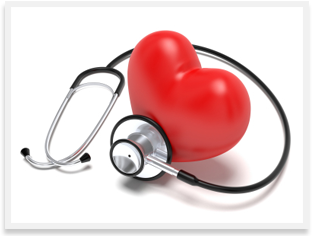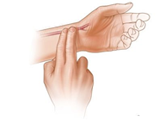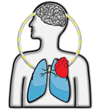
Understanding how to keep your heart healthy should be the first thing we ever learn. It's the most vital to our survival and good health.

Cardiac Health — Basics:
We know that cardiac disease remains the #1 killer of the US adult population — but do you really get what's happening, why cholesterol might matter, and how to give yourself the best fighting chance against the new 'Bubonic Plague,' of sorts?
Here are 3 little-known facts about cardiac disease that will likely change the way you view living 'healthy':
1Cholesterol is not necessarily bad, not even the "bad" kind.2Heart Rate Recovery (HRR) may be one of the best predictors of cardiac disease — even more important than resting heart rate, according to many practicing clinicians and cardiologists that I know.3A low-fat diet may be one of the fastest ways to create cardiac disease (controversial.)
Cholesterol has an evil connotation in health, and is often treated as a primary instigator of cardiac and vascular disease. As the son of a Vascular Surgeon, I recognize the importance of reducing cholesterol to prevent the advancement of life-threatening disease; however, many factors need to be considered:
 How high are your triglycerides?
How high are your triglycerides?If your triglycerides are high, your high cholesterol could be a symptom of inflammation in your body due to the way you're breaking down carbohydrates, rather than the primary causal issue taking place in your body.
 What is the ratio between your "bad" (LDL) cholesterol and "good" (HDL) cholesterol?
What is the ratio between your "bad" (LDL) cholesterol and "good" (HDL) cholesterol?If you have less than a 2:1 ratio, meaning that your HDL is relatively high compared to your LDL, this can actually be a negative cardiac risk factor. For example, an HDL of over 60 is suggestive that you have a lower risk of cardiac disease — so long as your total cholesterol is not over 180, which is the recommended max level by the American Heart Association.
 What else is in your diet or environment that may be causing inflammation?
What else is in your diet or environment that may be causing inflammation?Before you begin taking a pharmaceutical prescription to counteract cholesterol in your body, it could be a good idea to have a candid discussion with your physician. If you smoke, eat trans fats, lots of preservatives, live in a toxic environment, or are chronically stressed, your body could be inflamed for reasons outside of your cholesterol intake. This means that you could be taking a drug to lower your cholesterol, which is the only true indicator that you're doing something else wrong. When your cholesterol numbers improve on the drug, you're actually masking the true cause of health deterioration.

Next, let's talk about Heart Rate Recovery (HRR) and its application to monitoring your health and preventing cardiac disease. HRR is measured 10 and 60 seconds after you finish exercising, to determine how quickly your heart can get back to its resting rate. A healthy heart should be able to relax by at least 20-30 beats per minute within the first 60 seconds after exercising and should be within 10-15 beats of your resting heart rate within the first couple minutes after a workout or intense exercise set.
If your heart is unable to recover quickly from intense exertion, then the demands on your body completely change, and so will your exercise outcome:
1Hormones will become imbalanced as a result of prolonged sympathetic stimulation (fight or flight response not calming quickly enough, causing prolonged catecholemine release.)2You may experience a reciprocal blood pressure response, killing your following set or energy level to follow a workout. In other words, if your heart rate is higher than your body wants, you'll automatically lower your blood pressure by dilating your arteries, allowing your body to undergo less stress; however, your energy level will plummet as a result of this response and you'll instantly feel tired.3You'll hit your 'lactate threshold' too early, which limits your exercise potential and tolerance. Your lactate threshold is the point at which your body stops consuming oxygen for energy and begins to develop lactic acid as a byproduct of a different form of an energy cycle. This lactic acid creates soreness, shuts down signals to our muscles, and ends our workouts. Increasing your lactate threshold is paramount to your success in working out, or in achieving better health.
Finally, I feel it's important we discuss an extremely controversial topic: Low Fat Diets.
I find them to be evil and the wrong idea, altogether — logically speaking, they don't make any sense to me. Think about it this way — we have 3 macronutrient groups in the foods we eat: carbohydrates, proteins, and fats. Here's how this works:
 In the first 15 minutes we exercise or move, we tend to lean on carbs as our primary energy source.
In the first 15 minutes we exercise or move, we tend to lean on carbs as our primary energy source. From 15-40 minutes, we lean mostly on proteins as an energy source.
From 15-40 minutes, we lean mostly on proteins as an energy source. From 40 minutes up until 2-3 hours, fats serve as our primary energy source.
From 40 minutes up until 2-3 hours, fats serve as our primary energy source.
Of course, it's a continuum, and transfer between macronutrient classes for energy is relative. "The Wall," which is commonly referred to in marathon runners is the point at which you become totally carb depleted, and this tends to take place around mile 23 in most competitive runners. If we are not able to transfer our energy requirements between carbohydrates, proteins, and fats, we can carb deplete much faster. It's "fat" that allows us to balance macronutrient use for much longer, leading to prolonged energy and a wall happening as far out as possible — without fats, we don't stand a chance.
A low-fat diet appears to be a healthy option — with the goal of reducing cholesterol and blood pressure — when the body has inflammation, other macronutrients aren't properly balanced and sequenced, and exercise isn't a part of someone's life. Sadly, this is the state of the 'average' American and what I believe to be the #1 confounding variable of all low-fat diet studies; we need to isolate a truly 'healthy' person from the 'average American,' and then repeat the studies — those who are unhealthy should pursue an anti-inflammatory diet for at least 6 weeks before beginning a high fat/low carb diet — I'll bet we get different results.
I beg of you to consider the natural role of cholesterol in our bodies when inflammation isn't present, to utilize HRR as a measure of your level of fitness and health, and high fat/low carb diets as a possible long-term option once you correct for other variables. Your health and vitality depend upon the simple decisions you make today, and the logic you can apply to all of the health information you've learned; I believe you'll make the right choice.
Cardiac Health – Advanced:
1Sudden Cardiac Death2The Heart, Lung, & Brain Connection (heart attacks, strokes, and more)3Blood Pressure Simplified

These three topics speak loudly to all of us — we know that they are real threats to our lives, not just our happiness, but do we really know how to prevent any/all of them?
I want you to learn everything I know about living without the threat of these nasty cardiac health issues. Communicate with your heart for better heart health, learn about warning signs, how to prevent them from becoming chronic, and how to integrate independent healthy living with your physician's recommendations.
Sudden cardiac death remains a controversial topic and is most often seen in muscular, quick athletes. The best evidence I've seen so far suggests these athletes have an enlarged left ventricle of the heart, which was previously thought to reduce chances of heart disease — allow me to explain and differentiate:
 Intraventricular hypertrophy (the 'real threat'): This is an enlargement of the inside of the left ventricle of the heart, which reduces the amount of space for blood to be expelled to the rest of the body, thereby increasing strain on the heart significantly. This type of heart muscle growth takes place from super heavy lifting, especially when using the 'Valsalva Maneuver,' or holding your breath to increase intra-abdominal pressure while lifting; commonly, this technique is used in power lifting and Olympic lifts, which tend to be over-used by super muscular athletes in power-based sports. By reducing power training frequency to 2-3x/week — supplementing with plyometric training which does not require this breath hold — and balancing with endurance-based or metabolic lifting, intraventricular hypertrophy can be avoided altogether while continuing to rapidly increase muscular power.
Intraventricular hypertrophy (the 'real threat'): This is an enlargement of the inside of the left ventricle of the heart, which reduces the amount of space for blood to be expelled to the rest of the body, thereby increasing strain on the heart significantly. This type of heart muscle growth takes place from super heavy lifting, especially when using the 'Valsalva Maneuver,' or holding your breath to increase intra-abdominal pressure while lifting; commonly, this technique is used in power lifting and Olympic lifts, which tend to be over-used by super muscular athletes in power-based sports. By reducing power training frequency to 2-3x/week — supplementing with plyometric training which does not require this breath hold — and balancing with endurance-based or metabolic lifting, intraventricular hypertrophy can be avoided altogether while continuing to rapidly increase muscular power. Extraventricular hypertrophy (works against cardiac disease and thought to also prevent sudden cardiac death): This is an enlargement of the outside of the left ventricle of the heart. Instead of narrowing the chamber for blood, it strengthens the muscular wall on the outside of the heart, allowing a more forceful contraction with every beat. This more forceful contraction of the left ventricle contributes to a larger 'cardiac output,' which is the amount of blood expelled from the left ventricle. Ultimately, when you strengthen the outer wall of the left ventricle, your heart doesn't have to work as hard to get blood to the rest of your body.As you can see, there is a night and day difference between allowing 'intra' and 'extra'-ventricular hypertrophy to take place; balance strength, power, and plyometrics while building endurance and it's thought you can prevent this tragic event in most cases. Understanding the effect of training on your heart is paramount to your long-term fitness and athletic success.
Extraventricular hypertrophy (works against cardiac disease and thought to also prevent sudden cardiac death): This is an enlargement of the outside of the left ventricle of the heart. Instead of narrowing the chamber for blood, it strengthens the muscular wall on the outside of the heart, allowing a more forceful contraction with every beat. This more forceful contraction of the left ventricle contributes to a larger 'cardiac output,' which is the amount of blood expelled from the left ventricle. Ultimately, when you strengthen the outer wall of the left ventricle, your heart doesn't have to work as hard to get blood to the rest of your body.As you can see, there is a night and day difference between allowing 'intra' and 'extra'-ventricular hypertrophy to take place; balance strength, power, and plyometrics while building endurance and it's thought you can prevent this tragic event in most cases. Understanding the effect of training on your heart is paramount to your long-term fitness and athletic success.
Next, let's talk about the heart, lung, and brain connection. The heart prioritizes nourishment of the lungs, itself, and the brain first (in this order.) Therefore, any strain on these areas will result in cardiac strain and a change of priority for bloodflow to the rest of the body; if your lungs aren't working well and are under stress, your heart will prioritize bloodflow to this area to keep you breathing. This will reduce (in a very slight amount) or delay bloodflow to the brain and result in less concentration or more strain on the brain. Oxygenation of the brain is vital to its survival, so it all begins with great bloodflow to the lungs and heart; without this, everything has to work harder to survive and function decreases.
Likewise, there is a reciprocal response that takes place between heart rate and blood pressure; when blood pressure goes down, heart rate goes up to make up for the lack of bloodflow and to expel more blood to the rest of the body. The opposite is also true.
Every time there is a change of bloodflow, either through heart rate or blood pressure, everything changes. Your body will prioritize its survival over all other functions, so often times, when you notice you're cloudy a lot, this is a great indicator that perhaps your lungs aren't being properly oxygenated, or your heart is under strain.
Interestingly, the occurrence of a stroke or heart attack is caused by the same thing: cardiac disease. A stroke, or a cerebrovascular accident (CVA), is the same thing for the brain as what takes place during a heart attack, or myocardial infarction (MI.) Essentially, there is too much demand on the heart or brain through a lack of oxygenation, and this results in various forms of self-destruction. In both instances, clean arteries, a normal resting heart rate, and a normal blood pressure response to stress take away the possibility of these occurring.
Stress presents itself in many forms, but the brain thinks about the stress your body is under and attempts to communicate this to you through multiple channels:
 Change in stimulation (fight or flight, or super tired and rest and digest)
Change in stimulation (fight or flight, or super tired and rest and digest) Concentration levels plummeting, or cloudiness occurring
Concentration levels plummeting, or cloudiness occurring Breathing difficulty
Breathing difficulty Pain in distribution patterns relating to heart strain (brain sends pain signals down left arm and into hand, through chest, or through other vital organs like your intestines and esophagus — reflux is a big one for women)
Pain in distribution patterns relating to heart strain (brain sends pain signals down left arm and into hand, through chest, or through other vital organs like your intestines and esophagus — reflux is a big one for women) Frequent headaches, suggesting blood pressure issues in the brain, or neuro-excitation
Frequent headaches, suggesting blood pressure issues in the brain, or neuro-excitation Numbness or tingling in one side of the body, but just barely sensed, as a precursor of a CVA taking place (depending on the severity, this can be referred to as a TIA, or a trans-ischemic attack, which is basically a mini-stroke.)Ultimately, the relationship between heart, lung, and brain health comes down to:
Numbness or tingling in one side of the body, but just barely sensed, as a precursor of a CVA taking place (depending on the severity, this can be referred to as a TIA, or a trans-ischemic attack, which is basically a mini-stroke.)Ultimately, the relationship between heart, lung, and brain health comes down to:1Easy delivery and return of blood to/from the lungs2Heart self-nourishment ability (clean arterial flow allows for this)3Oxygenated blood delivery to the brain
And this all begins with:
 Improved lung capacity
Improved lung capacity Breathing technique (diaphragmatic breathing vs chest breathing vs bucket-handle breathing — diaphragmatic should be the majority)
Breathing technique (diaphragmatic breathing vs chest breathing vs bucket-handle breathing — diaphragmatic should be the majority) Low cholesterol adherence to arterial walls (through low triglycerides and low levels of inflammation in the body)
Low cholesterol adherence to arterial walls (through low triglycerides and low levels of inflammation in the body) Low stress levels, or better yet, better stress attenuation and management so there is less of a 'anxiety or tension response' to stress when it occurs
Low stress levels, or better yet, better stress attenuation and management so there is less of a 'anxiety or tension response' to stress when it occurs Proper nutrition, so the bloodflow that gets to the brain gets properly utilized through brain glucose absorption and sustained concentration levels as an indicator that this is taking place
Proper nutrition, so the bloodflow that gets to the brain gets properly utilized through brain glucose absorption and sustained concentration levels as an indicator that this is taking place Strong muscular pump action to help the venous system return de-oxygenated blood back to the heart after pumped to the entire bodyYour body is connected, brilliant, and capable. First, give it oxygen, then let the blood flow all around, absorb great nutrients derived from your eating habits, and lastly, help the blood return back to your heart by taking strain off of your veins and putting it through your muscles instead. This can all be overly complicated and difficult to process, or you can think about it simply and ask yourself the following questions:
Strong muscular pump action to help the venous system return de-oxygenated blood back to the heart after pumped to the entire bodyYour body is connected, brilliant, and capable. First, give it oxygen, then let the blood flow all around, absorb great nutrients derived from your eating habits, and lastly, help the blood return back to your heart by taking strain off of your veins and putting it through your muscles instead. This can all be overly complicated and difficult to process, or you can think about it simply and ask yourself the following questions: Do I breathe by raising my shoulders up instead of belly out?
Do I breathe by raising my shoulders up instead of belly out? Do I get short of breath frequently?
Do I get short of breath frequently? Am I feeling cloudy a lot?
Am I feeling cloudy a lot? Does my blood pressure go low often?
Does my blood pressure go low often? Is my resting heart rate high?
Is my resting heart rate high? Does it take me a long time to recover from exercise?
Does it take me a long time to recover from exercise? Is my blood pressure chronically high?
Is my blood pressure chronically high? Do I have trouble dealing with stress and feel anxiety, breathing difficulty, or tension in the chest?
Do I have trouble dealing with stress and feel anxiety, breathing difficulty, or tension in the chest?*IMPORTANT: If you've answered 'yes' to any of the questions above, it's time you take another look at your health and address these issues first.
Finally, it's time to simplify the blood pressure confusion that exists — the main problems are actually:
 Inflammation
Inflammation High Resting Heart Rate (RHR)
High Resting Heart Rate (RHR) Stress attenuation response
Stress attenuation response Electrolyte imbalance
Electrolyte imbalance Higher priority health issue
Higher priority health issue

When you have inflammation in your body, cholesterol is more likely to adhere to your arterial walls. This causes decreased space for blood and forces you to exert more effort to move blood through your arteries and deliver it to vital organs, muscles, and other body tissues. Conversely, when you consume cholesterol and don't have inflammation in your body, you are able to pull out fatty acids that provide immense health benefits, and it turns out to be quite useful for improving your overall health.
A high RHR is an indicator that your system is under stress. If you've ever been sick, you understand that your pulse is going nuts until you feel better, as is your blood pressure; essentially, your body is working harder to get rid of the 'bug' and help you feel better, sooner. When your RHR is high, it's a valid and important indicator that your body is trying to 'fix' something and your system is under moderate to severe stress. By increasing your anaerobic capacity and aerobic endurance levels, you can greatly reduce your RHR. In my mind, the goal should be under 60 beats per minute (bpm), but recommended American Heart Association standards say between 60-100 bpm. If you want to be 'truly healthy,' I recommend you get your RHR much lower.
Your stress attenuation response, as briefly described above, is your body's response to stress. Fundamentally, it's important that you realize how stress works in your body, as both happy and anxiety-producing activities produce stress, which leads to a cumulative response:
 Eustress — "good stress" — like getting an 'A' on a test, a promotion at work, or watching your child perform in a sports game and do amazingly well.
Eustress — "good stress" — like getting an 'A' on a test, a promotion at work, or watching your child perform in a sports game and do amazingly well. Distress — "bad stress" — like failing a test, getting fired, or watching someone important to you get hurt or ill.
Distress — "bad stress" — like failing a test, getting fired, or watching someone important to you get hurt or ill.Ultimately, it's the combined effect of both that dictates how much stress your body is undergoing. Equally important to the amount of stress your body is dealing with is the way your body handles stress. If you are able to calm down quickly, like a zebra, then your body can feel excited, immediately find a relaxation point, and react in a productive way; on the other hand, if you feel stress and find your mind going in circles trying to resolve what's happening, or you calm down slowly, you are at a much greater risk for cardiac disease. This means that you are also likely to have a very high blood pressure response associated with stress, which over time, may result in chronically high blood pressure.

Electrolytes — like calcium, potassium, magnesium, and sodium — are just as important as hydration. If you consume an adequate amount of water, but you don't balance electrolytes, your body will react by raising your blood pressure and lowering cellular metabolism. The end result is a poor state of health, and in some cases, severe cardiac risk. By eating a bit of salt (not too much) in your diet, bananas, veggies, and other electrolyte-rich foods, you are balancing your electrolytes and improving your body's function.
Another reason for increased blood pressure is a higher priority health issue taking place, which is largely related to what you experience when you're sick and you feel your pulse and/or blood pressure increase. Basically, if you have any system of your body under strain, you react the same way as a common cold, or more intensely. Your body increases the intensity of vital function to help you resolve the higher priority health issue (i.e. digestive dysfunction, respiratory difficulty, Diabetes, etc.) and raises your blood pressure. Rather than immediately medicating with a blood pressure reducer, perhaps it makes more sense to evaluate what is causing this response in your body. I recommend you evaluate diet, physical activity, and all systems of your body to determine why your blood pressure got out of whack to begin with, before you make any strong moves in a direction of long-term pharmaceutical care.
Cardiac health can seem like a complicated issue that feels overwhelming. Instead, I'd love for you to think logically about your heart health, and why your heart is one of the best indicators of ways to improve your health. Your body is smart, and it's set up with multiple systems of redundancy to help you correct your health.
If your pulse rate is high, your blood pressure response to physical activity is off, or you regularly experience a sign/symptom of not being at 100%, it's time to take a thorough look at your health. One of the best starting points is figuring out if you're even 'in' the right starting place, to begin with.

Let's get your cardiovascular system integrated with the rest of your body, build exercise tolerance, and learn the most important aspects of taking your health to the next level.

